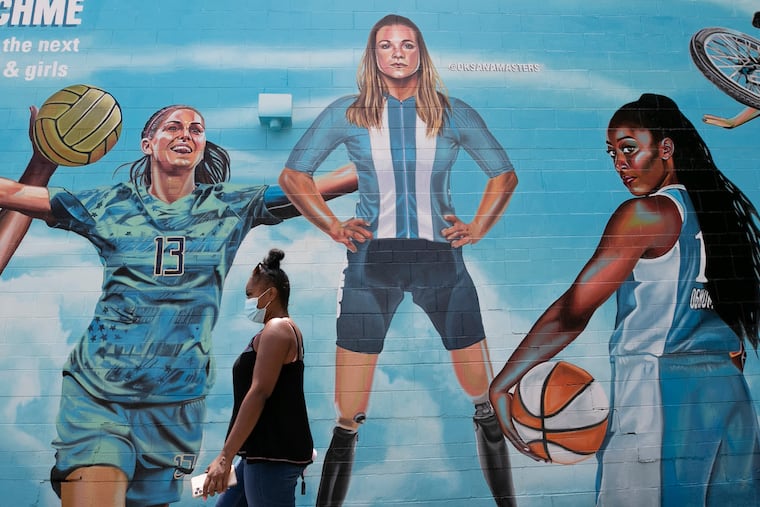What’s renowned Paralympian Oksana Masters doing on a Philadelphia mural?
Of all that she's done, inspiring a little girl not to be ashamed of her prosthetic is at the top of Masters' proudest accomplishments.

Oksana Masters has emerged from the ashes of the catastrophic Chernobyl nuclear accident to become one of the most inspirational athletes on the planet. Her story is remarkable, but her focus is on the young girls of today.
She is part of a mural at 5729 Germantown Ave., along with four fellow female Team USAathletes. It is on the side of a shuttered crab restaurant at the corner of Germantown Avenue and Price Street, not far from Germantown High School, which also is closed.
There’s nothing more powerful, Masters asserts, than a determined woman. It’s a message she hopes the mural conveys, especially to the youth of that neighborhood.
A role model “is something I didn’t have as a little girl who looked different with a disability,” Masters said. “But then, when I chose to be an athlete, I never was able to see myself as an athlete because I didn’t get to see someone that looked like me. So I couldn’t believe that it was possible for me.”
Olympians Ashleigh Johnson (water polo), Alex Morgan (soccer), Chiney Ogwumike (basketball), and Chelsea Wolf (BMX) join Masters on the mural, which is sponsored by Secret brand deodorant and also appears on buildings in Atlanta and New York.
Masters has won eight Paralympic medals, but her first was as a rower in the 2012 Games in London. As such, Philadelphia holds a special place for her because of the time she spent training and competing here. The Ukrainian native even knows the correct pronunciation of Schuylkill.
She trained and raced along Boathouse Row at the Bayada Regatta from 2006-10.
“It’s amazing, especially driving at night and having all the houses lit up,” Masters said from her home in Champaign, Ill., about Boathouse Row. “It’s so cool, and I think unless you’re a rower, you don’t really appreciate it for being as amazing as it is. And the history of the iconic boathouses that are there. I love it.”
Masters is looking to add to her trophy cabinet next month as part of the U.S. cycling team. It would give her medals in four sports in five Paralympics. She was fourth in hand cycling at the most recent summer games in 2016 in Rio de Janeiro.
» READ MORE: From the archives: Local Ukrainians recall the Chernobyl disaster
Masters, 32, was born in Khmelnitsky, Ukraine, three years after the 1986 Chernobyl nuclear accident that killed 30 and maimed countless more. Because the region was saturated with radiation poisoning, she was born with six toes on each foot, webbed fingers, and one leg shorter than the other. She spent her first seven-plus years in Ukrainian orphanages until she was adopted by Gay Masters.
“I didn’t save her,” Masters’ adoptive mother told the Louisville Courier-Journal last year. “She would have saved herself. That kid is a survivor.”
Masters’ left leg was amputated below the knee when she was 9. The right leg was taken at age 14.
What it’s all about
Masters has two gold medals, a silver, and two bronze in various cross-country skiing events. She has two silvers in biathlon, and that bronze from 2012 in rowing. In 2020, she was named “Sportsperson of the Year with a Disability” at the Laureus Sports Awards in Berlin, Germany.
But her favorite accomplishment cannot be found in a record book.
“OK, so one of my proudest moments, and I feel like this is what it all really boils down to, is the moment I started wearing my prosthetic legs and making them visible to the world and not hiding them,” she said.
“There was a family member who shared my picture and my story to a little girl who had one prosthetic leg, and she was in fifth or sixth grade. She would always hide her legs. [However], her parents wrote to me that, after seeing me and my legs, she decided to go into school one day wearing a dress and showed her leg.
“And that is,” she paused, collecting her thoughts, “that is what it’s all about.”
“Sports was this healthy outlet for me, of discovering myself, embracing myself and seeing how I’m powerful regardless of the fact I don’t have legs.”
Masters points to a Women’s Sports Foundation study that found girls are dropping out of competitive sports at twice the rate of boys. Keeping girls involved might not necessarily lead to a medals’ podium, but it often leads to improved self-esteem and confidence.
Secret deodorant has launched the “Watch Me” campaign to help with resources and other support to keep girls involved.
“To me, it’s inspiring that little girl to be able to look in the mirror and see power within herself and not being defined or letting people define how she looks, or because she’s a girl, or because she looks different, or because she’s a girl with a prosthetic leg that wants to be on the softball team,” Masters said.
“That she can do it all and be confident in her skin and be able to just chase her dreams regardless of it. And to know that is making her irreplaceable in this world.”